#Jewish students at Columbia university
Text
"In Our Name: ..." an article written by Jewish students at Columbia University.
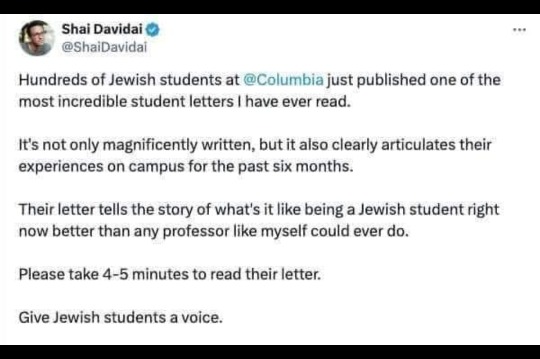
#antisemitism#jumblr#Jewish#Jewish students at Columbia university#Jewish students write article about their experiences at Columbia university#I/p war#Give Jewish students a voice#GIVE JEWS A VOICE#LET US SPEAK FOR OURSELVES WE DONT NEED YOU SPEAKING FOR US AND WE NEVER WANTED IT#Goyium listen up#A great article#Jewish Students a CLU#Let Jewish voices be heard now#Bring them home#fuck hamas#hamas is isis#i stand with israel#am yisrael chai#This is insanity
2K notes
·
View notes
Text

Shai Davidai needs to be FIRED and de-platformed. He's a danger to Palestinian/Arab/Muslim students and allies to Palestinian liberation. That has been proven time and again.
Here is another beautiful moment/act of solidarity I wanted to share that happened on the same campus:
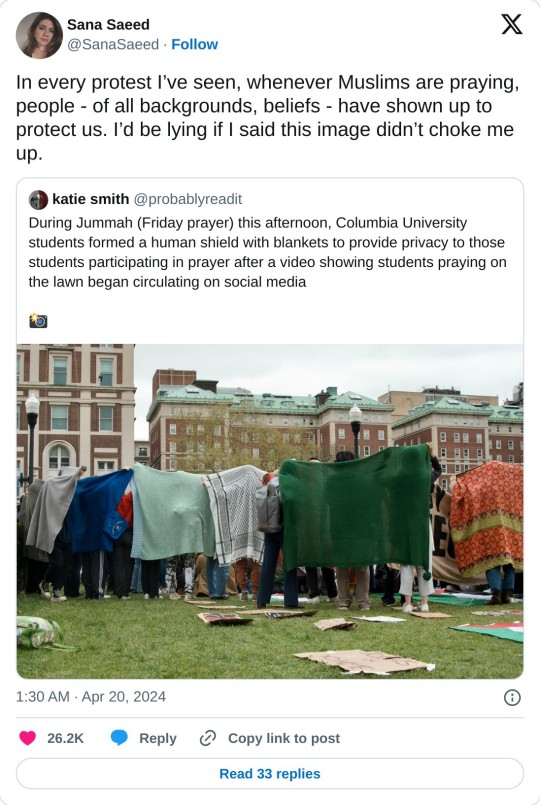
#feminist#social justice#free palestine#palestine#free gaza#current events#current news#columbia university#jewish voice for peace#solidarity#columbia jewish students#columbia muslim students#gaza under siege#united states
4K notes
·
View notes
Text
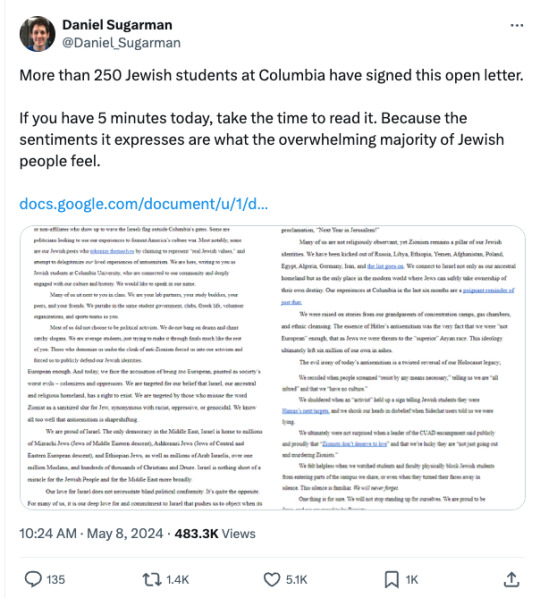
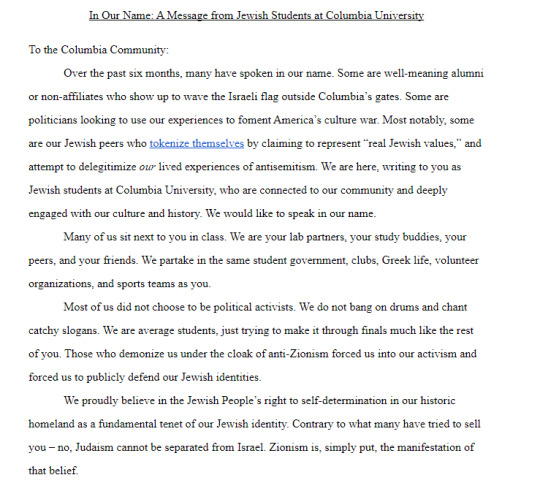
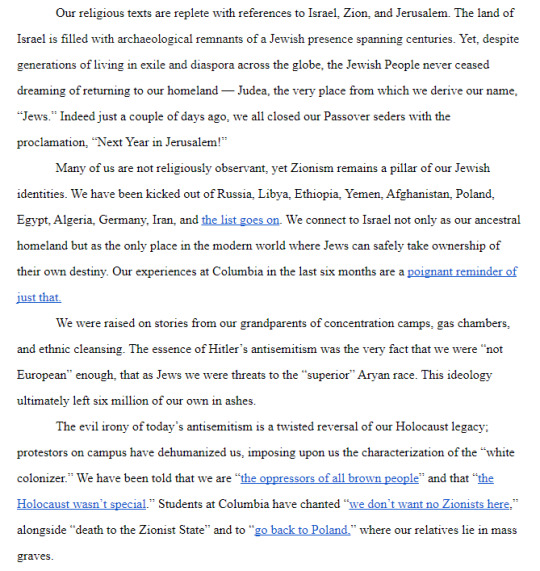
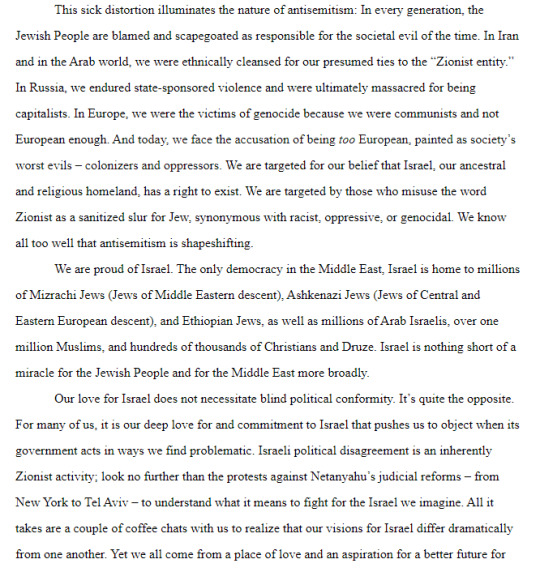
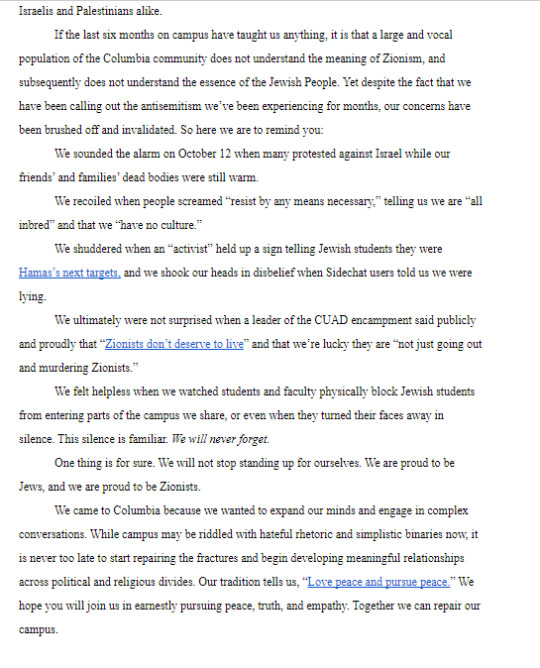
Source
231 notes
·
View notes
Text
Hamas has once again rejected the hostage deal
I can't even remember how many they already rejected at this point..
The deal included ceasefire and a detailed aid program.
They do not care about their civilians.
There are still 133 hostages held by Hamas, in addition to dozens of bodies.
I'm tired of this war, bring them home now.
#israel#israeli#gaza strip#טאמבלר ישראלי#israel palestine conflict#ישראל#hamas is isis#middle east#jewish#jewblr#Iran#gaza now#free gaza#gaza#gazaunderattack#gaza genocide#fuck israel#genocide#free palestine#columbia university#student protests
107 notes
·
View notes
Text
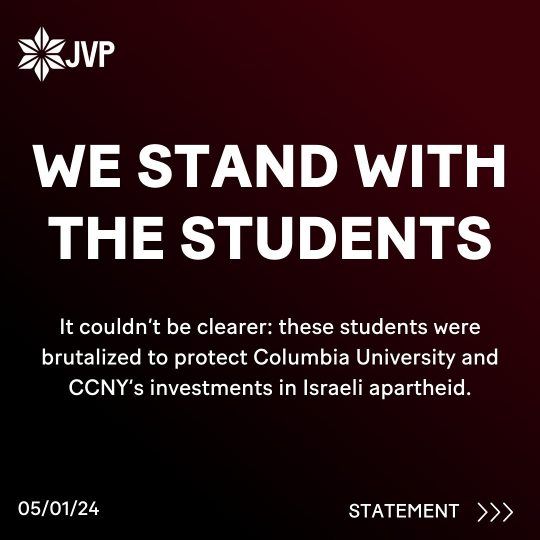
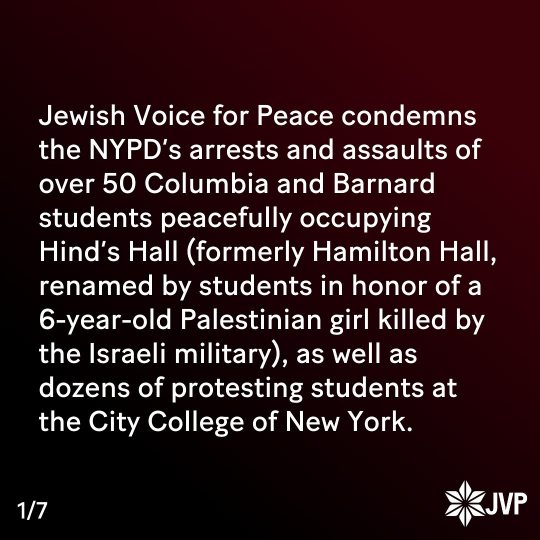
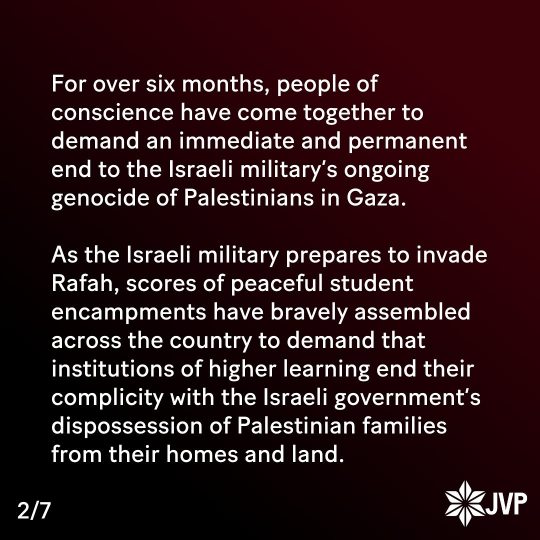
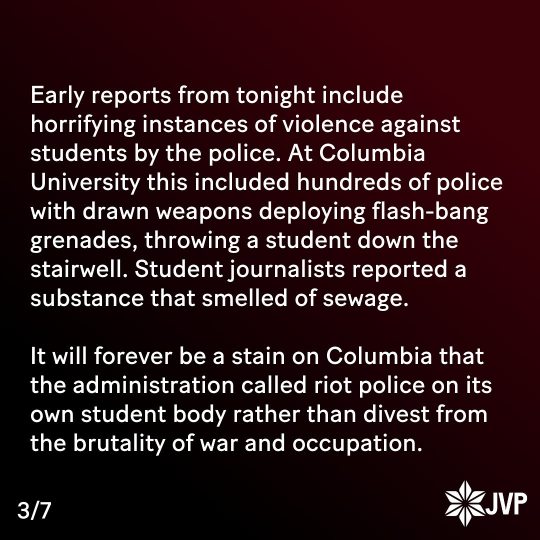
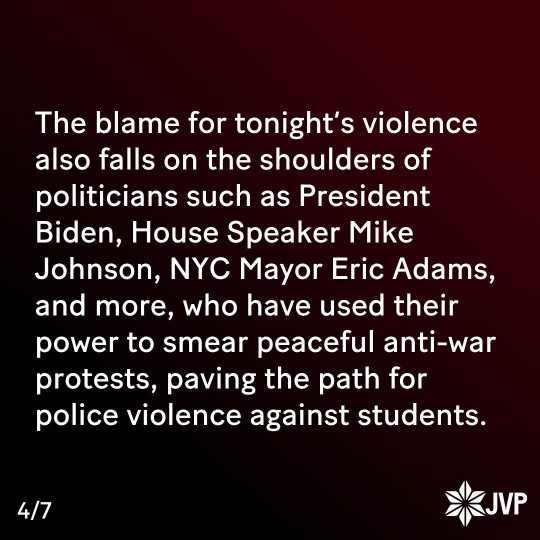
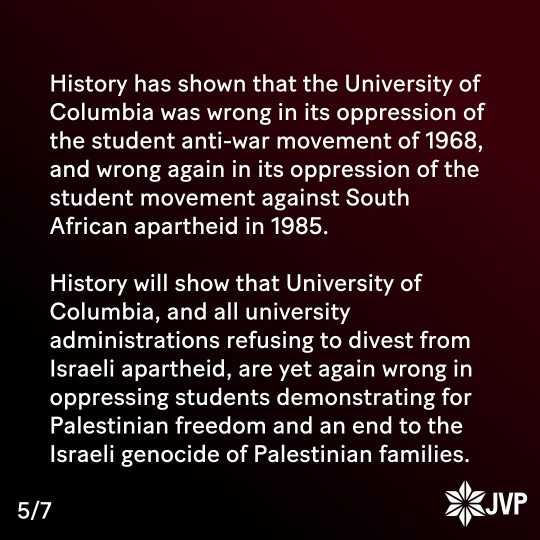
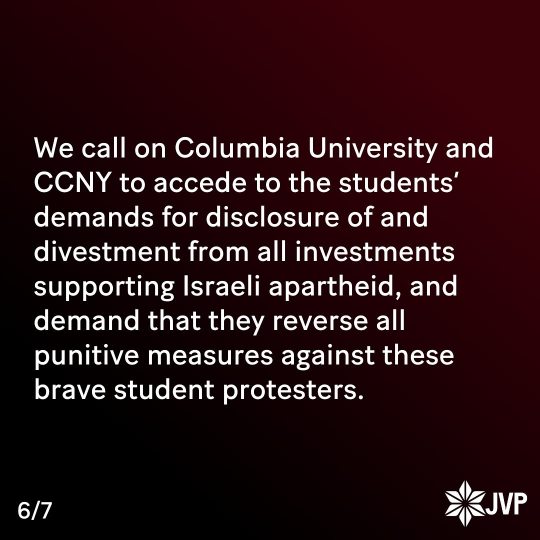
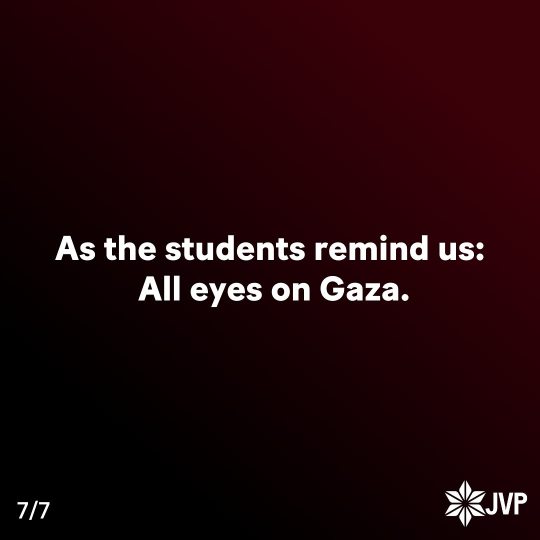
#Repost @jewishvoiceforpeace
UPDATE: Last night, NYPD brutally arrested at least 282 students.
History has shown that the Columbia University was wrong in its oppression of the student anti-war movement of 1968, and wrong again in its oppression of the student movement against South African apartheid in 1985.
History will show that University of Columbia, and all university administrations refusing to divest from Israeli apartheid, are yet again wrong in oppressing students demonstrating for Palestinian freedom and an end to the Israeli genocide of Palestinian families.
We call on Columbia University and CCNY to accede to the students’ demands for disclosure of and divestment from all investments supporting Israeli apartheid, and demand that they reverse all punitive measures against these brave student protesters. As the students remind us: All eyes on Gaza.
115 notes
·
View notes
Text

Yes, Babylon Bee is a satyrical site, but . . .
142 notes
·
View notes
Text
Over 40 student organizations at Columbia University from the Black Student Organization to Student Worker Solidarity to the Columbia National Lawyers Guild have joined a reinvigorated coalition aimed at urging Columbia to divest all economic and academic stakes in Israel, according to an op-ed signed by the student groups Tuesday.
...
The 40+ student groups were “further moved to action by the ostensibly politically-motivated” suspension of two student groups last week, Students for Justice in Palestine and Jewish Voice for Peace, both of which also signed the op-ed.
Columbia University thought they could silence students calling for an end to Israel's genocide of Palestinians by suspending the campus chapters of SJP and JVP.
Instead, their discriminatory action united several dozen other student groups on campus to renew their call to demand solidarity and accountability from their university.
Read their full list of demands HERE and check out the link above for the full list of student orgs who make up the coalition.
#free palestine#ceasefire now#columbia university#students for justice in palestine#jewish voice for peace
170 notes
·
View notes
Text
LMFAO
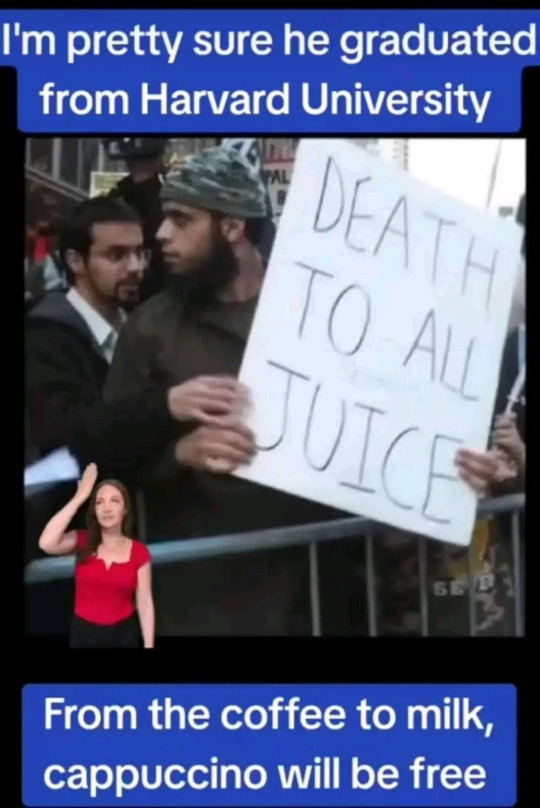
#israel#secular-jew#jewish#judaism#israeli#jerusalem#diaspora#secular jew#secularjew#islam#israel hamas war#hamas#hamas massacre#hamas is isis#hamas war crimes#hezbollah#university protests#student protests#college protests#columbia university#campus protests#USC#UCLA#ucla protests#protests#columbia#harvard#queers for palestine
59 notes
·
View notes
Text
Hamas Live Like Kings While Palestinians Suffer
Hamas suck the Palestinian people dry. They don't care about the people. Meanwhile, Benjamin Netanyahu & his right wing coalition government implement their own Holocaust on the people of Gaza; cutting off criticsl supplies and bombing civilians.
#democrats#republicans#election#donald trump#biden 2024#muslim#arab#ceasfire now#gaza genocide#palestinian lives matter#jewish#catholic#christian news#columbia university#student protests
13 notes
·
View notes
Text
Who Rules Over You?
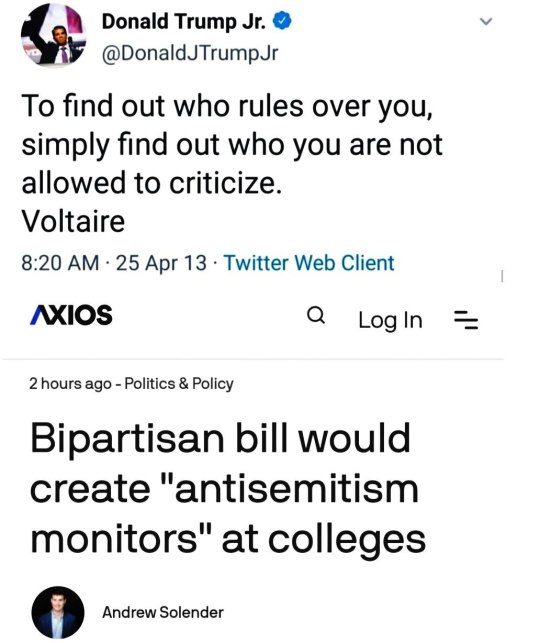
We now have Political Commissars.
#photography#gaza#palestine#palestinians#free palestine#islam#islamophobia#israel#jews#jews for palestine#jews against israel#jews for ceasefire#jews of tumblr#jewish#antisemitism#anti zionisim#zionistterror#zionazis#zionistcensorship#america#usa#americans#biden#united states#usa news#usa politics#protest#columbia university#student protests#aaron bushnell
14 notes
·
View notes
Text
by Dion J. Pierre
Columbia University’s Task Force on Antisemitism has released a new report detailing the numerous challenges that Jewish and pro-Israel students at the school have faced since Hamas’ massacre across southern Israel on Oct. 7.
“While mourning Hamas’ unspeakable atrocities on Oct. 7, some Jewish and Israeli Columbia affiliates have been the object of racist epithets and graffiti, antisemitic tropes, and confrontational and unwelcome questions, while others have found their participation in some student groups that have nothing to do with politics to be increasingly uncomfortable,” the task force’s report said, calling on the university to enforce civil rights protections.
The report also discussed violations of rules for holding demonstrations on campus, noting that “protesters have disrupted classes and events, taken over spaces in academic buildings, held unauthorized demonstrations, and used ugly language to berate individuals who were filming these protests or just walking by.” Columbia has been a hub of anti-Israel and pro-Hamas demonstrations for the past five months.
Most notably, the report explained that Columbia University has not treated Jews the same as other protected groups, allegedly ignoring their concerns about antisemitic speech uttered by anti-Zionists despite issuing tendentious statements about other “protected classes” in times when “policing, affirmative action, sexual assault, transgender rights, and other important issues” are the subjects of tense public debate.
“This is a challenging issue, since there are important reasons to value the perspective of both the speaker and the audience,” the report continued. “But regardless of how this issue is resolved, the university needs to be consistent in its approach.”
Anti-Israel demonstrators at Columbia University transformed the campus into an enclave of antisemitism where Jewish students have been berated and assaulted at whim after Oct. 7, the group Students Against Antisemitism claimed in a lawsuit filed last month with the help of the StandWithUs Legal Center for Justice.
The complaint alleges that after bullying Jewish students and rubbing their noses in the carnage Hamas wrought on their people, pro-Hamas students were still unsatisfied and resulted to violence, beating up five Jewish students in Columbia’s Butler Library. Another attacked a Jewish student with a stick, lacerating his head and breaking his finger, after being asked to return missing persons posters she had stolen.
Following the incidents, pleas for help went unanswered and administrators told Jewish students they could not guarantee their safety while Students for Justice in Palestine (SJP) held its demonstrations, according to the lawsuit. The school’s powerlessness to prevent anti-Jewish violence was cited as the reason why Students Supporting Israel, a recognized pro-Israel school club, was denied permission to hold an event on self-defense. Events with “buzzwords” such as “Israel” and “Palestine” were forbidden, administrators allegedly said, but SJP continued to host events while no one explained the inconsistency.
Responding to the task force’s report, Columbia University president Minouche Shafik complimented the authors in a copiously worded statement, but she did not commit to implementing their recommendations.
“I welcome the the initial report of the Task Force on Antisemitism and am grateful to the co-chairs and task force members from Columbia, Barnard College, and Teachers College for their hard and thoughtful work,” Shafik said. “As the task force makes clear, it is essential to ensure that debates and disagreements across Columbia are rooted in academic rigor and civil discourse, and that Jewish students, faculty, and staff, and all members of our community, feel safe, supported, and included. The task force’s important work will continued across a number of fronts as the university works to address this ancient, but sadly persistent, form of hate.”
The task force’s work has not stopped anti-Zionist students at Columbia University from continuing to attack Jewish identity.
On Monday, The Columbia Spectator reported that the Columbia College Student Council voted to hold a referendum on a question, written by the Columbia University Apartheid Divest coalition, asking students to support the boycott, divestment, and sanctions (BDS) movement. The BDS movement seeks to isolate Israel from the international community as a step toward the Jewish state’s eventual elimination.
Among other things, the referendum question calls for shuttering the university’s Tel Aviv Global Center before it opens and cancelling a dual degree program administered in partnership with Tel Aviv University.
31 notes
·
View notes
Text
Assaulting and Denying Jews to move freely around campus is not resistance you morons
Just like mass rape, kidnapping and murder is not resistance
#columbia university#anti zionism#anti zionisim#israel#jewish#israeli#jewblr#israel palestine conflict#gaza strip#טאמבלר ישראלי#ישראל#hamas is isis#middle east#student protests#Iran
24 notes
·
View notes
Text
video, short article, and transcript in link
The university responded to the attack by first scolding the organizers for holding an “unsanctioned” rally, then later said it had banned the suspects from campus while police investigate. This comes after Columbia administrators banned the local chapters of Students for Justice in Palestine and Jewish Voice for Peace in November, with students describing a climate of censorship and retaliation for pro-Palestinian activism on campus. “Overall, it’s been a very clumsy handling,” Columbia professor Mahmood Mamdani says of the school’s response to student protests and campus safety. We also speak with Columbia Law School professor Katherine Franke, who says concerned faculty “have been spending an enormous amount of time protecting our students from the university itself.” —January 25, 2024
#news#Free Palestine#Columbia University#New York#protests#rallies#Columbia University Apartheid Divest#Israel#chemical weapons#skunk#Students for Justice in Palestine#Jewish Voice for Peace#Mahmood Mamdani#Columbia Law School#Katherine Franke#Professors Slam Columbia’s Response to Chemical Skunk Attack on Students at Pro-Palestine Protest#democracynow.org
0 notes
Text
by Jessica Costescu
The report, released Monday, is the task force's first attempt to provide recommendations to Columbia's leaders regarding their response to rising campus anti-Semitism. Student protesters at Columbia have advocated for terror against Israelis. During a pair of January rallies, students cheered on the Iran-backed Houthi terrorists and chanted, "From New York to Gaza, globalize the intifada," and "From the river to the sea, Palestine will be Arab."
The term "intifada" references violent Palestinian uprisings in Israel that featured terror attacks on civilians, including suicide bombings at bus stations and night clubs. Columbia's rules bar students from inciting violence "against members of our community." Still, Columbia's Task Force on Antisemitism said it would not provide guidance on whether phrases such as "Globalize the Intifada" violate those rules, instead encouraging the university's "legal team" to provide "more guidance on this issue."
"Many have heard chants at protests like 'Globalize the Intifada' and 'Death to the Zionist State' as calls for violence against them and their families," the task force wrote in its report. "The University also has said that calls for genocide, like other incitement to violence, violate the rules."
"While we agree with this principle, the application of it should be clarified," the task force continued. "Many of the chants at recent Columbia protests are viewed differently by different members of the Columbia community: some feel strongly that these are calls to genocide, while others feel strongly that they are not. … Since this ultimately is a matter of legal compliance, we do not offer a detailed analysis here."
The report comes months after debate around campus calls for "intifada" rocked the Ivy League.
#columbia university#taskforce on antisemitism#columbian university taskforce on antisemitism#intifada#jewish students#from the river to the sea#globalize the intifada
55 notes
·
View notes
Text
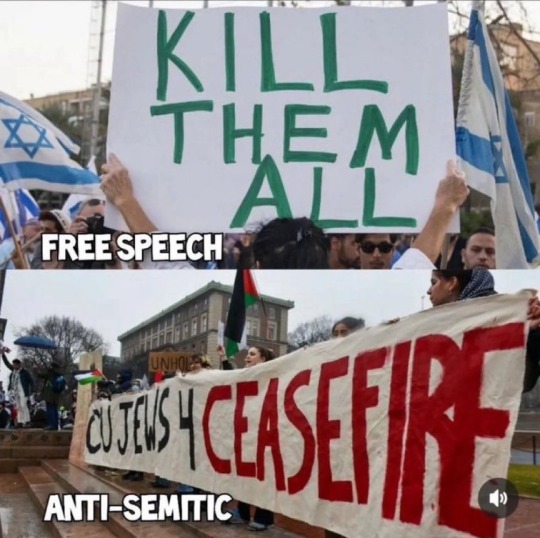
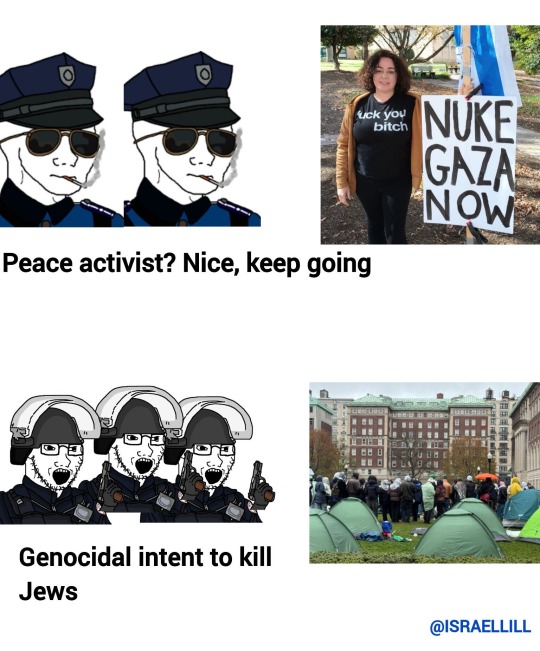
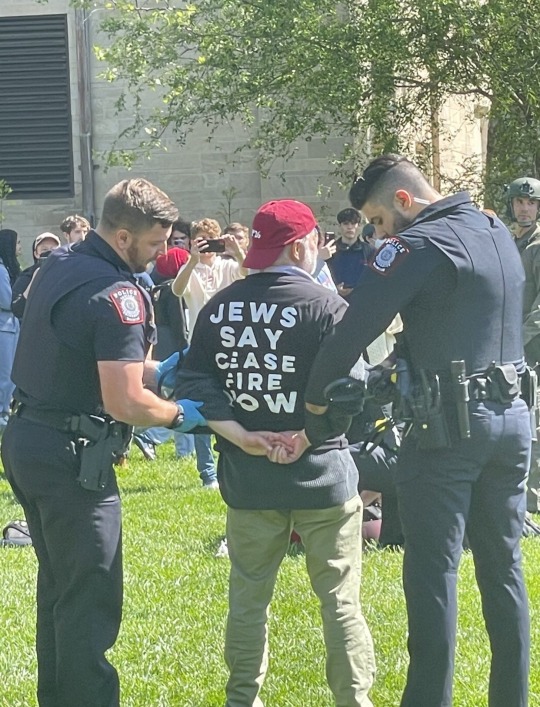
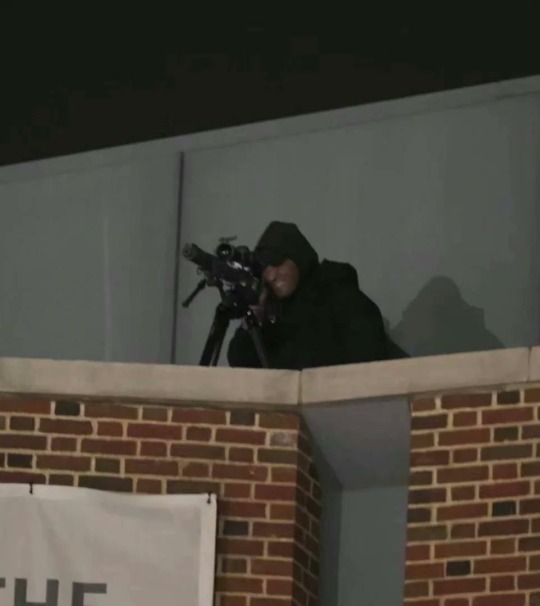
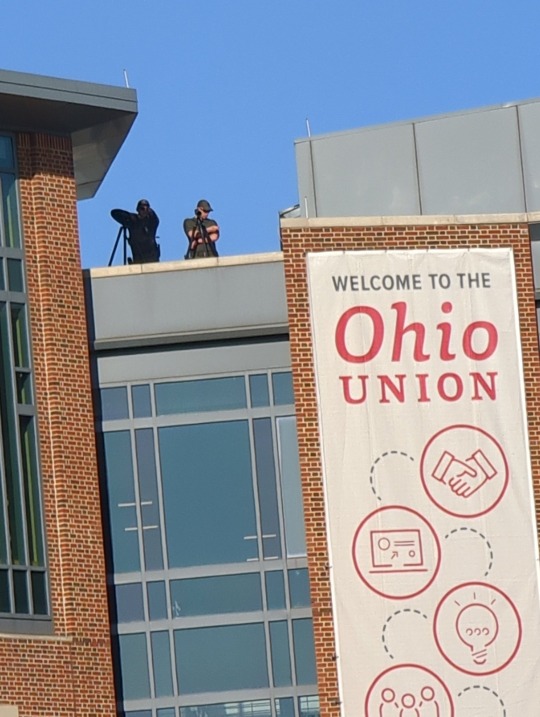
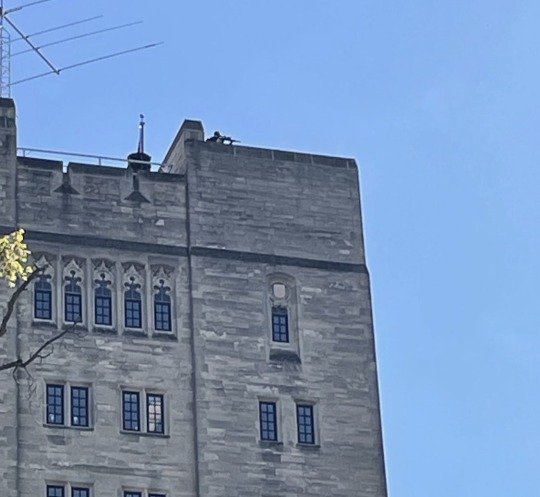
Peaceful anti war/pro Palestine protestors are being beaten and attacked by police with snipers on rooftops. Hundreds of Jewish students and faculty members being arrested.
Vs
Actual Nazis on the columbia university campus protesting.
If you’re Jewish in America this should be pretty terrifying. America protects its fascist that includes Zionists.
3K notes
·
View notes
Text
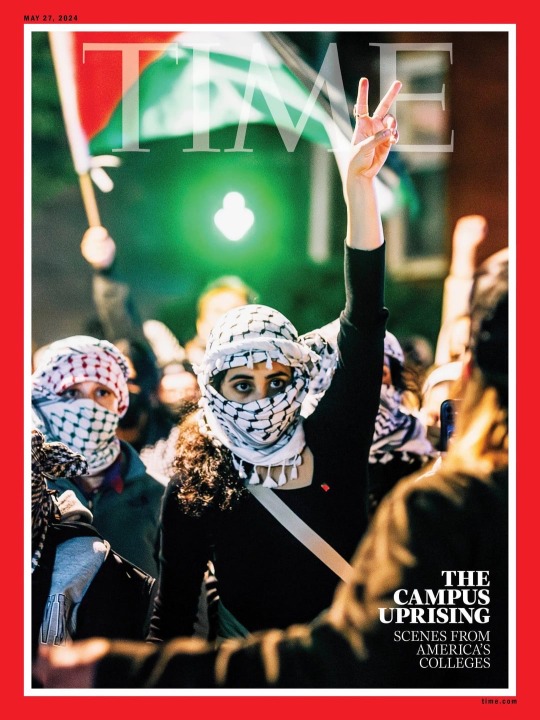
“I'm observing such a huge gap between different social groups that I didn't even realize were different. I, you know, most of my friends are in the media. A lot of my journalist friends are just much better informed.
A lot of them have had experience reporting in Israel, Palestine, and are quite critical of both Israel and the antisemitism narrative. Then, like, my wife is a lawyer, and her circle is a little bit different, right? It's not dominated by media people, like people in the law or in other professions seem to be broadly much more kind of taken by the sense of profound insecurity and shift in the American Jewish experience.
I think we sort of see different things, for example, when we watch the hearings in Congress on antisemitism on campus.
The university presidents, of which there have now been two hearings, one with three presidents, one with the president of Colombia, and there will be many, many more. And what I see is a right-wing campaign against higher education that is weaponizing antisemitism as an idea, right? Not antisemitism as a practice.
And what they see is, with the possible exception of the president of Colombia, is people who represent institutions or lead institutions that they feel an affinity with, often institutions that they graduated from, who are not standing up for them. Which I find that viewing of those hearings somewhat shocking because people seem to be turning off their critical faculties. But people, intelligent, educated, politically astute people don't turn off their critical faculties unless they're scared.
So I think the underlying fear is real. But just because it's real, it doesn't mean it's justified.
I think a factual account of what we're seeing on campuses now is that this generation of Americans is far more critical of Israel than their parents' generation. And this is true of both Jews and non-Jews. I think that they look at information available to them and they see a 57-year brutal illegal occupation.
And they don't understand how it's possible that their parents and the politicians that their parents support and the politicians who come and give commencement addresses and all that other stuff that I can say about politicians, how it is possible that these people support that state? I think that is an entirely understandable view. It also reflects a huge generation gap.
I think some of those young people are assholes, and some of them are antisemites. I think it's a small minority of the protesters, and it is not actually part of the critique. The protesters' demands, the protesters' organizing beliefs are not in any way or shape antisemitic.
And then there are Jewish students who were brought up Zionist, who were brought up to identify strongly with the state of Israel, who are, I think, a little bit like my cousin in the settlements again. They see these protests, and even probably the participation of their fellow Jewish students in these protests, as threatening their core identity, as threatening their ties to their families, as threatening everything that they were taught for the first 18 years of their lives is true. And of course they feel rattled, of course they feel unsettled, of course they feel threatened.
Like, wouldn't you, if you felt that everything you had believed in was being turned on its head, and if you, by apparently reasonable people? And so you have a couple of options. One is to look at what the protestors are saying, to engage with the facts, to engage with the critique of everything you've ever believed.
There was a terrific, George Curran's podcast a couple of weeks ago with three Columbia students, one of whom sort of narrated that kind of trajectory, getting to university and finding this stuff out and having their mind blown. That's a very difficult path, and it's a very difficult path, especially if you are, say, a first year student in 23, 24.
And then there's the easier path of staying integrated in your community, in your beliefs, and saying this is antisemitic.
Because unfortunately the things that the protestors are talking about are so horrible that you can't say, okay, let's agree to disagree, that you can't hold both of these things in your mind at the same time.
You can't continue to hold your family's uncritical, long-standing support of Israel, and an understanding of what is happening in Gaza and the occupation that has preceded the war in Gaza.
So yeah, of course they feel rattled. That doesn't mean that they're being surrounded by antisemitism.”
—Masha Gessen, the descendant of Holocaust survivors, discusses campus protests (part 3 of 3)
#politics#palestine#israel#masha gessen#student protests#campus protests#columbia university#anti zionism ≠ antisemitism#weaponized antisemitism#weaponized zionism#identity politics#idpol#ethnic cleansing#genocide#israel is a terrorist state#israel is an apartheid state#gaza#rafah#antisemitism#islamophobia#🇵🇸#college protests
530 notes
·
View notes